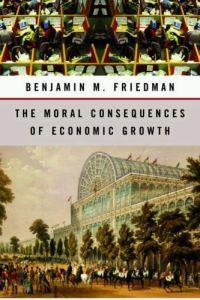

Purchase
The Moral Consequences of Economic Growth
Benjamin M. Friedman
a persuasive, wide-ranging argument that broadly distributed economic growth provides benefits far beyond the material, creating and strengthening democratic institutions, establishing political stability, fostering tolerance, and enhancing opportunity.
Knopf
October 2005
592 pages
ISBN: 0679448918
Hardcover
Add to Wish List
Non-Fiction
From the author of Day of Reckoning, the acclaimed critique
of Ronald Reagan’s economic policy (“Every citizen should
read it,” said The New York Times): a persuasive, wide-
ranging argument that broadly distributed economic growth
provides benefits far beyond the material, creating and
strengthening democratic institutions, establishing
political stability, fostering tolerance, and enhancing
opportunity. “Are we right,” Benjamin M. Friedman asks, “to care so much
about economic growth as we clearly do?” To answer,
Friedman reaches beyond economics. He examines the
political and social histories of the large Western
democracies—particularly of the United States since the
Civil War—distinguishing times of generally rising living
standards from those of pervasive stagnation to illustrate
how rising incomes render a society more open and
democratic. He shows, too, how our attitudes toward
economic growth and its consequences have roots in the
thinking of prior centuries, especially the Enlightenment,
and also include significant strands of religious influence. Friedman also delineates the role of economic growth in
determining which developing nations extend the broadest
freedoms to their citizenry. He makes clear that growth,
rather than just the level of living standards, is key to
effecting political and social liberalization in the third
world. But he also warns that the democratic values of
countries even as wealthy as our own are at risk whenever
incomes stagnate for extended periods. Merely being rich is
no protection against a society’s retreat into rigidity and
intolerance once enough of its citizens lose the sense that
they are getting ahead. Finally, Friedman shows us why, if America is to strengthen
democratic institutions around the world as a bulwark
against terrorism and social unrest, we must aggressively
pursue growth at home and promote worldwide economic
expansion beyond what purely market-driven forces would
create. And for the United States, he offers concrete
suggestions for policy steps to achieve those objectives. A major contribution to the ongoing debate on the effects
of economic growth and globalization.
Comments
No comments posted.
Registered users may leave comments.
Log in or register now!
| 


 © 2003-2025 off-the-edge.net
all rights reserved Privacy Policy
© 2003-2025 off-the-edge.net
all rights reserved Privacy Policy